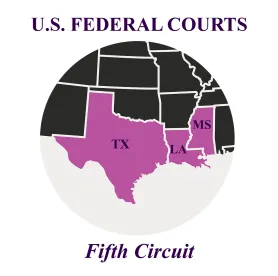The United States Court of Appeals for the Fifth Circuit recently handed down a victory to individuals and entities seeking to protect attorney-client-privileged materials from government seizure. By ruling in favor of a company that had challenged the government’s seizure of privileged materials pursuant to multiple search warrants, the Fifth Circuit found that the district court erred in determining that government cannot be said to “callously disregard” a person’s rights with respect to a search based on the simple fact that they obtained a warrant beforehand, nor can the government indefinitely retain copies of privileged documents.
The Fifth Circuit’s opinion in Harbor Healthcare Systems, L.P. v. United States, 5 F.4th 593 (5th Cir. 2021) is notable as the latest opinion in a growing chorus of federal courts that have criticized the manner in which the government used “filter teams” a/k/a “taint teams,” i.e., groups of government attorneys designated by the government to be in charge of reviewing and filtering privileged material seized pursuant to warrants in order to prevent such materials from ending up in the hands of investigation teams. This is a practice that the Fourth and Sixth Circuit Courts of Appeal have compared to leaving the government fox in charge of guarding the hen house. See In re Grand Jury Subpoenas, 454 F.3d 511, 519 (6th Cir. 2006); In re Search Warrant Issued June 13, 2019, 942 F.3d 159 (4th Cir. 2019). The opinion is also notable as a rejection of the government’s long-held position that it may retain copies of returned privileged materials without depriving a person of their rights.
The company in this case, Texas-based Harbor Healthcare, L.P., filed a pre-indictment motion pursuant to Federal Rule of Criminal Procedure 41(g) for the return of its property. Rule 41(g) provides that “[a] person aggrieved by an unlawful search and seizure of property or by the deprivation of property may move for the property’s return.” Harbor sought the return of documents seized by the government in five separate searches of its locations and offices in connection with investigations into potential federal crimes. In executing its search warrants, the government seized hundreds of boxes of paper records and 3.59 terabytes of data, including 29 smartphones, 20 computers, and computer hard drives. The government assembled a taint team to review and filter the materials from the investigation team.
Harbor asserted that many of the seized materials were attorney-client privileged and even included communications with the company’s outside counsel. After the seizures, Harbor repeatedly sought to meet with the head of the taint team to discuss the return of the privileged material, to no avail.
On Sept. 7, 2018, Harbor filed its Rule 41(g) motion seeking the return of its property. In its motion, Harbor asserted that the government had displayed a “callous disregard” for its rights in failing to inform the judges that issued the search warrants that it intended to seize privileged materials and in failing to adequately protect those materials post-seizure. Harbor presented largely uncontroverted evidence that the government had allowed a significant number of privileged documents to be reviewed by the attorneys outside the taint team in charge of conducting the criminal investigation. For its part, the government argued that it had not violated Harbor’s rights because it obtained search warrants and instituted proper procedures for protecting the privileged materials. Significantly, the government also maintained that Harbor did not need the materials returned because the government’s materials were duplicates and the company had possession of the originals.
In denying Harbor’s Rule 41(g) motion, the district court ruled that the government did not callously disregard Harbor’s rights because it had obtained search warrants prior to seizing the materials. The district court also determined that Harbor would have a remedy for any violations of its constitutional rights by way of a motion to suppress, in the event an indictment was ever returned. Harbor appealed.
The Fifth Circuit reversed the district court and remanded the case for further proceedings consistent with its opinion. In its ruling, the Fifth Circuit found that the government’s search warrants did not insulate them from a charge that they had callously disregarded Harbor’s rights, given the government’s stipulation that it had not sought express prior authorization from the issuing magistrate judge to seize privileged materials. Also problematic was the government’s continued retention of the documents for years after the search. It further explained that a motion to suppress the use of the privileged material in any future criminal proceeding was not an adequate remedy because there was no certainty that any criminal case would ever be brought and that such a future motion would not relieve Harbor’s present alleged injury—being deprived of its property and the ongoing harm such retention caused to its privacy. Thus, even though Harbor had the original materials in its possession, the Fifth Circuit found “[t]he government’s ongoing intrusion on Harbor’s privacy constitutes an irreparable injury that can be cured only by Rule 41(g) relief.”
Certain government searches and seizures may violate the constitutional rights of natural persons and entities. The Fifth Circuit’s opinion in Harbor Healthcare is reflective of a growing trend: federal courts are beginning to hold the government to account when the government retains privileged materials without adequate justification or otherwise mishandles those materials






 />i
/>i

